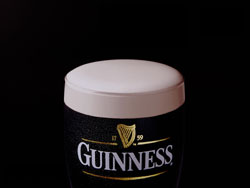Yet more reasons to drink beer
 I have always liked Guinness, especially on tap. A nice, cool pint of Guinness slows things down a bit, as you watch it slowly settle to its characteristic dark stillness, with this creamy, meditative – but confident – head.
I have always liked Guinness, especially on tap. A nice, cool pint of Guinness slows things down a bit, as you watch it slowly settle to its characteristic dark stillness, with this creamy, meditative – but confident – head.
Recently, Beer Advocate published an interview with Fergal Murray, one of the company’s head brewmasters, and he gave the Alström Bros. the inside scoop about Guinness:
Murray explained that the recipe for Guinness has undergone only minor adjustments over the years. Every keg of Guinness Draught imported to the US comes from St. James’s Gate in Dublin (though Guinness Extra Stout is made in Canada). It contains water, malt, roasted barley, hops and yeast – and that’s it. Like many major labels, Guinness relies on “high-gravity brewing,†which involves large batches of wort (unfermented beer) high in fermentable sugars (note to beer geeks: the goal is a final gravity of 1072). Eventually these are watered down to attain a 4.2 percent ABV (alcohol by volume). The brewers also blend batches to aid in consistency, and the beer is pasteurized.
Mysteries of Guinness Revealed, Beer Advocate, by the Alström Bros, 04-11-2006
Guinness is a remarkable product – produced in enormous quantities by an international conglomerate. Every day, 10 million pints of Guinness are poured in 150 countries. Yet they manage a remarkable consistency and quality for such a mass-market product.
One of the interesting bits of information to me was the relative purity of the product, with no weird chemicals added to the beer, and the comparison of the caloric value: Guinness has only 125 kCal per 12 ounce serving – less than a Budweiser (ugh). Heck – a 12-ounce can of regular Coke has 144 kCal and may contain the carcinogen benzene. And then there are the Coca Cola deathsquads in Columbia. I have not heard of any Guinness death squads.
Forget soda – pour me another Guinness.